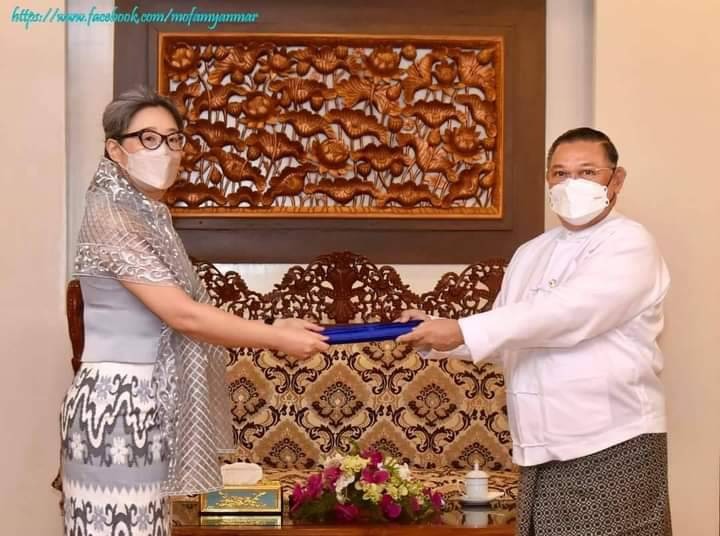By Paul Greening
Guest Contributor
The United Nations (UN) has come under heavy criticism from CSOs and Myanmar people generally by signing memorandums of Understanding (MoUs) and Letters of Agreement (LoA) with the military regime, and by presenting their credentials with smiling photos. IOM was the fourth this week and there are many MoUs in process. The UN seems to be queueing up to engage with the junta. The procession of smiling UN heads presenting their credentials and shaking hands gives the junta the legitimacy it craves. The UN claims that it is necessary for the greater good of the people but the people disagree.
Is it a necessary evil for the greater good? What is a little photo op compared to being in Myanmar and supporting the people? Unfortunately, it is far more than this. It is saying to the military that they recognize them as the leaders of the country. There needs to be a proper assessment of exactly how much support the UN is able to give since the attempted coup. As one UNICEF international staff member said, “We are doing very little.” However, it pays high salaries and rents expensive offices. Without a presence in Myanmar this may not be possible. Other UN agencies are already working through Civil Society Organisations (CSOs) and Community Based Organisations (CBOs) because they don’t have access.
The UN has a number of other justifications for why they should engage with the junta and have a presence in Myanmar.
One of the more spurious UN arguments is that they have over 2,000 staff in Myanmar who have families and they would lose their jobs and the economy of the local community would be affected. In other words, they are worried about their jobs. Both international and national UN staff are well paid and should be able to survive on their savings for a considerable time. As for the economy, UN staff tend to congregate in the more upper market establishments, so the effect will be limited.
Another argument is, “We do humanitarian aid and are not involved in politics.” This is such a ridiculous argument it is hardly worth mentioning. Humanitarian aid is always political.
‘The UN presence means that we are witnesses to what is happening’
Sitting in air conditioned offices either in Myanmar, or in other countries, does not help in being a witness. Most of the information they get is from local organisations and even then, international UN staff are often very ignorant of what is going on. Their presence in the country doesn’t mean they are witnesses.
‘Without the UN the people won’t get humanitarian aid and suffering will increase’
This is the main argument used to excuse engagement with the military regime. There is already increasing suffering which will continue as long as the junta exists. It is dubious to what extent the UN is and will be able to distribute humanitarian aid and it is clear that the junta is and will continue to weaponize humanitarian aid and use it for their own purposes.
Look at the Japanese rice rotting in Arakan because the junta won’t allow its distribution. This violates the UN principles of neutrality and of delivering aid based on need and not a party’s political and military interest. Also, where is Human Rights Upfront which is rarely if ever mentioned in UN agencies?
Most UN activities are contracted out to CSOs or contractors such as construction companies. This can be done from outside the country. Often the UN has the grant and takes 30 percent or more for their administration and contracts it to an INGO who then takes about 20 percent for administration etc. They then contract the work to CSOs. The Grand Bargain in 2016 criticized this system and advocated for more funds going direct to the
CSOs. This has had limited success. To comply with inflexible donors there can be an INGO as grant holder which can advise and be an intermediary between the donor and CSO and take on the responsibility of most of the administration of the grant. They will only need skeleton staff and it won’t be essential for them to be in the country.
Humanitarian aid does not have to even go through international organisations. EAOs, NUG and CSOs know the terrain and are more able to distribute aid than the UN without having to follow the junta directions and restrictions. Much of this can be cross border. This is already happening and can be scaled up. Local organisations have been doing cross border aid for years. In many areas of Myanmar the UN has no access and is already giving cash to monasteries and churches for them to distribute directly through their networks.
So, the UN claims that it is engaging with the junta, which undermines the resistance, to support the people of Myanmar who they can’t reach without junta approval. A cynic may wonder whether the UN wishes to remain in Myanmar for the people or themselves. It often seems the UN would like to patch things up and carry on as usual on ‘the road to democracy’. This scenario became impossible only a few weeks after the coup. There is no going back.
Most international actors are defaulting to the inside Myanmar junta approach. Donors need to be flexible and work with NUG, EAOs, CSOs and the fairly recent Peoples Administrative Organisations (PAOs) and trust them to deliver aid within Myanmar and across borders. If the military regime controls the UN aid missions it will be able to use them to advance their reach to attack resulting in more suffering which is the opposite of the UN stated objectives.



